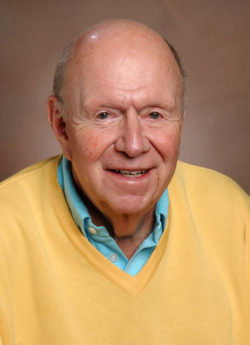Robert H. Allen, MD ’66, HS ’72

Robert H. Allen, MD, the Cleo Meador and George Ryland Scott Professor of Hematology Research and former chief of the Division of Hematology at the University of Colorado Health Sciences Center, is a renowned physician-scientist whose research has led to several clinical innovations in the diagnosis and understanding of deficiencies of cobalamin (B12) and folate.
His pioneering work began while he was a resident and then fellow at Washington University School of Medicine. With a background in protein biochemistry and medicine, Allen focused his initial research on the link between B12 deficiencies and a glycoprotein called intrinsic factor that binds B12 and is integral for the absorption of the vitamin into the body. He successfully used an innovative procedure, affinity chromatography, to isolate and purify intrinsic factor for research. It contained no other B12-binding proteins or other proteins.
After moving to the University of Colorado, Allen discovered that human serum contained a number of inert B12 analogs that were not bound by intrinsic factor. He also found that the intrinsic factor used to measure serum B12 in commercial assays actually contained significant amounts of another B12-binding protein that bound B12 and the serum B12 analogs. Thus, the serum B12 level that was the diagnostic test for B12 deficiency commonly used around the country was, in fact, an assay for the sum of B12 and B12 analogs. As a result the sum of B12 and B12 analogs was reported unknowingly to physicians and approximately 15% of such patients had “normal values” for “serum B12” even though their B12 levels were actually low. Many such patients were not treated with B12 and developed severe neurologic abnormalities. He subsequently created a new, more accurate test that used his pure intrinsic factor and measured just B12 (New Engl J Med 299: 785-792, 1978). It became the standard diagnostic test for B12 deficiency in the United States and around the world.
B12 and folate deficiency cause indistinguishable hematologic abnormalities, and B12 deficiency also causes a large number of neurologic and psychiatric abnormalities that are not seen in folate deficiency. Allen used Gas Chromatography: Mass Spectrometry (GC:MS) to develop new assays for metabolites that are elevated in B12 and folate deficiency. He showed that methylmalonic acid and homocysteine could be detected and quantitated in normal serum and that both were elevated in B12 deficiency. Only homocysteine was elevated in folate deficiency. He showed that treatment with B12 will normalize both metabolites in B12 deficiency and treatment with folate will normalize homocysteine in folate deficiency. Treatment with B12 will not lower homocysteine in folate deficiency and treatment with folate will not lower homocysteine or methylmalonic acid in B12 deficiency (New Engl J Med 318: 1720-1728, 1988). These tests have been commercially available since 1988 and have markedly improved the ability to differentiate, diagnose and treat B12 and folate deficiencies.
Allen served as an active member of the National Committee for Clinical Laboratory Standards (NCCLS) Task Force on Vitamin B12 Assay and persistently worked to translate his research into clinical guidelines for the treatment of nutritional deficiencies. He and his co-workers were the first to conduct a randomized clinical trial comparing a daily oral dose of 2 mg of B12 to 1 mg of B12 injected IM once a month. They found that the oral B12 was an effective and possibly superior treatment option (Blood 92: 1191-1198, 1998).
For his ongoing research contributions, Allen was the recipient of a prestigious MERIT Award from the National Institute of Diabetes and Digestive and Kidney Diseases. He also has served in administrative roles in the hematology division at the University of Colorado for more than 30 years. He is credited with invigorating and expanding the Hematology Fellowship Program and is known for his enthusiastic mentoring of young physician-scientists. Through his leadership, the university has developed a strong hematology program with a trifecta of academic, clinical and research excellence.
The Washington University Medical Center Alumni Association is pleased to present it Alumni Achievement Award to Dr. Allen.




